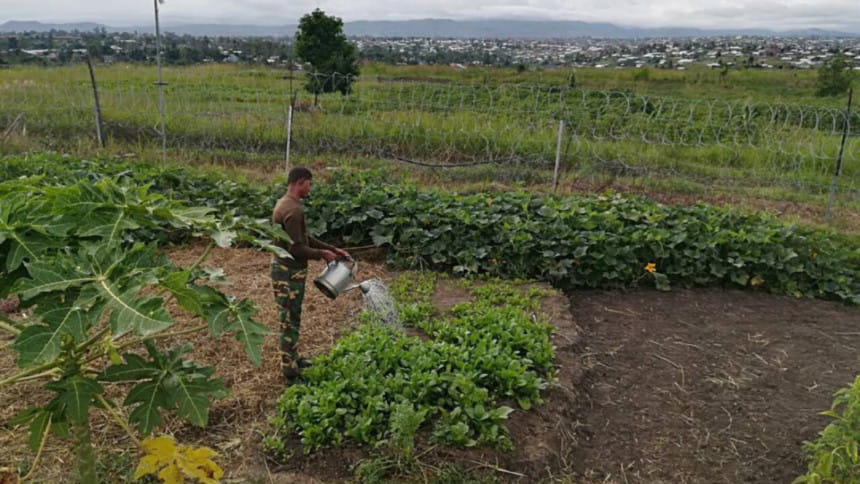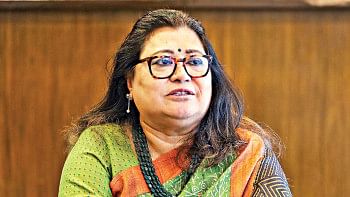A taste of home in Africa

More than physical discomfort and even mortal danger, Bangladeshi peacekeepers in Africa appear to be most haunted by their craving for Bangladeshi cuisine.
It is that craving which has changed the life of Adubang'o Dieudonne Jp, a Congolese who had worked as an interpreter at a Bangladeshi camp in Bunia, as well as the scenario of the Democratic Republic of Congo.
Jp's contract with the Bangladesh Battalion (BANBAT) expired two years ago but the experience he gained during his five-year service provides for his livelihood now.
Bangladeshi soldiers had brought seeds of some local vegetables like okra, pumpkin, cabbage, carrot, cucumber, gourd, spinach, etc so they could still have a taste of home in a foreign land.
Although the soil is naturally fertile in Congo, local crops are limited to cassava, potato, maize and just a few more.
The seeds that the peacekeepers had brought with them flourished and added a refreshing variety and taste to the local food. Jp also liked these new vegetables as well as the idea.
So when his contract expired, he leased a piece of land and started cultivating vegetables.
In fact, when this correspondent visited acres of vegetable plots around Bunia, it was found that besides Jp, many others were also growing pumpkin, squash, spinach and cabbage.
“Pumpkin and other vegetables are popular here. Vegetable farming brings me a handsome profit,” said an enthusiastic Jp.
Hasan Mohammad, Tojwiga and Orome also embraced the idea.
“Bangladeshi soldiers trained me and gave me some seeds two years ago. Now, I grow vegetables like squash, pumpkin, cucumber and cabbage,” Hasan said.
He has been cultivating two acres of land in Bunia which had been barren for years. “It has brought us money and opened our eyes. Now, we know better farming techniques,” Hasan added.
What used to be a vegetable patch in the camp's yard that soldiers would tend to when they were off duty, has now multiplied and crept into the countryside around Bunia, some 7,000km away from Bangladesh.
“Besides humanitarian activities and wining hearts of the local people, Bangladeshi peacekeepers are also promoting Bangladesh's agriculture in Africa,” said Maj Md Sazzad Hossain, Civil-Military Co-operation (CIMIC), chief of Northern Sector.
The Congolese do not know how to make the best use of their land although it is naturally fertile, he said, adding that locals of Bunia became interested in growing those vegetables when they saw the Bangladeshi camp site.
The Bangladeshi military and the agriculture ministry of Congo joined hands to provide the locals with free training and seeds, Sazzad added.
Approximately the size of Western Europe, Congo is one of the largest countries in the world with significant deposits of gold, but more importantly substantial amount of coltan, a highly priced uranium-rich ore.
Boasting half of Africa's forests, Congo has 40 million people dependant on their limited farming options.
Pacifique Keta Upar, vice governor of Bunia, said Bangladeshi peacekeepers had been working there since 2002 and had engaged local communities in various ways.
“They have helped the local people explore agriculture, bringing food diversity,” he added.
“The Democratic Republic of Congo is safe for investment. Bangladesh government or business community can invest in Congo,” the vice governor told The Daily Star.
He said he would invite interested parties to visit the country especially to explore the agriculture sector.
Two groups of Bangladeshi journalists were visiting some African countries to celebrate Bangladesh's 30 years in UN peacekeeping.

 For all latest news, follow The Daily Star's Google News channel.
For all latest news, follow The Daily Star's Google News channel. 



Comments